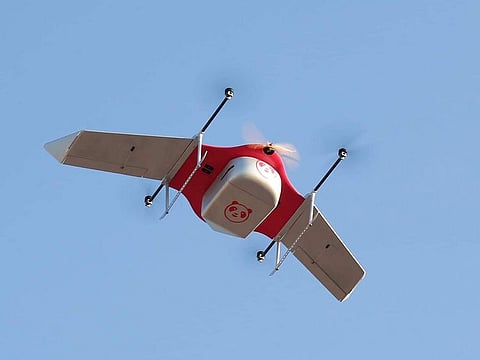Food delivery via drones to soon take off in Pakistan
‘PandaFly’ service will be expanded across the country after successful trials

Islamabad: Food delivery via drones will soon take off in Pakistan as the pilot project has been launched in Islamabad.
The food delivery company Foodpanda collaborated with Pakistani aerospace company Woot Tech to test the service in Islamabad.
Drone specifications
* It can deliver a maximum payload of 5kg at 90 km/h speed. * The maximum flight distance is about 20km. * It is allowed to fly 100 meters (300 feet) high. * Endurance – up to 30 min * Speed – 90 km/h * Max flight range – 20 km * Max payload weight – 5 kg * Altitude – 300 feet allowed
The ‘PandaFly’ service will be expanded across the country after successful trials. The test flight was conducted with support from Deputy Commissioner (DC) office in Islamabad at F-9 park on November 12.
The drone delivered a 2.5kg food package from one end of the park to the other with the help of two riders who loaded and collected the package and distributed food to children of Sweet Homes orphanage invited at the event.
The project would allow speedier food deliveries but not exactly in the way many would expect. The service launched in Pakistan will not be currently delivering food directly to homes. It is focused on middle-mile drone delivery service which means drones would fly from one point to another in a straight line bypassing traffic and other obstacles.
After the order is loaded on the drone, it will fly to a specified drop-off point where the Foodpanda rider will receive and deliver it to the customer. Pakistan’s drone regulatory requirements currently do not allow last-mile deliveries.
Pakistani company developed drones
The Foodpanda orders via drones in Pakistan will be made on a hybrid vertical take off and landing (VTOL) drone developed by Pakistani company Woot Tech which claims to be the first in South Asia to develop VTOL drones.
Talking to Gulf News, Dr Bilal Siddiqui, the chief operating and tech officer at Woot Tech, shared that the VTOL drone, being used for Foodpanda orders, is customized for deliveries of food and emergency medical supplies with temperature-controlled mechanism.
The company is working on the use of unmanned aerial vehicles (UAV) for civilian purposes including mapping, surveying, intelligence analytics, and delivery of packages, and has customers in UAE, Saudi Arabia, Turkey, Kenya and Norway, said Dr Siddiqui, who has two decades of experience in the industry. The drones will cut delivery time from 45 minutes in a dense urban area to just 10 minutes. While the $4-5 cost on a car will be reduced by five times.
“The use of disruptive technology by Foodpanda in the future will mean faster deliveries over longer distances” especially for customers living in peri-urban and remote areas who have limited food options. “The successful test flight and delivery has been highly encouraging” and will help evaluate and address the technical, operational and legal issues before the drone deliveries begin in Pakistan, said Nauman Sikandar Mirza, the CEO of Foodpanda, a subsidiary of Germany-based Delivery Hero.
DC Islamabad Hamza Shafqaat encouraged the new tech delivery service and offered all possible support. He believes that the use of technology can greatly help government agencies serve citizens better.
Drone technology prospects in Pakistan
The launch of a pilot project in Islamabad will pave the way for the commercial use of drones in Pakistan. But it would require an established regulatory framework. “Drones offer new opportunities for services and businesses. This project can help understand the future challenges to devise policies that ensure public safety while integrating the use of drones into Pakistan’s airspace,” Raheel Pasha Khan, CEO at Woot Tech, told Gulf News.
In March 2021, Pakistan’s Prime Minister Imran Khan approved the formation of an authority to regulate the use of UAVs and boost local production but the painfully slow process of legislation is hurting the local manufacturers. Experts say the regulation would help Pakistan tap into the commercial drone market, which is expected to touch $43 billion by 2025.
“There are few VTOL manufacturers in the world which means Pakistani companies can capitalize on opportunities and increase high technology exports” which can fuel faster economic growth, Pasha Khan said. The six-month-old startup Woot Tech is currently valued at $19 million and has achieved 65 per cent revenue target in the first quarter.
Sign up for the Daily Briefing
Get the latest news and updates straight to your inbox






